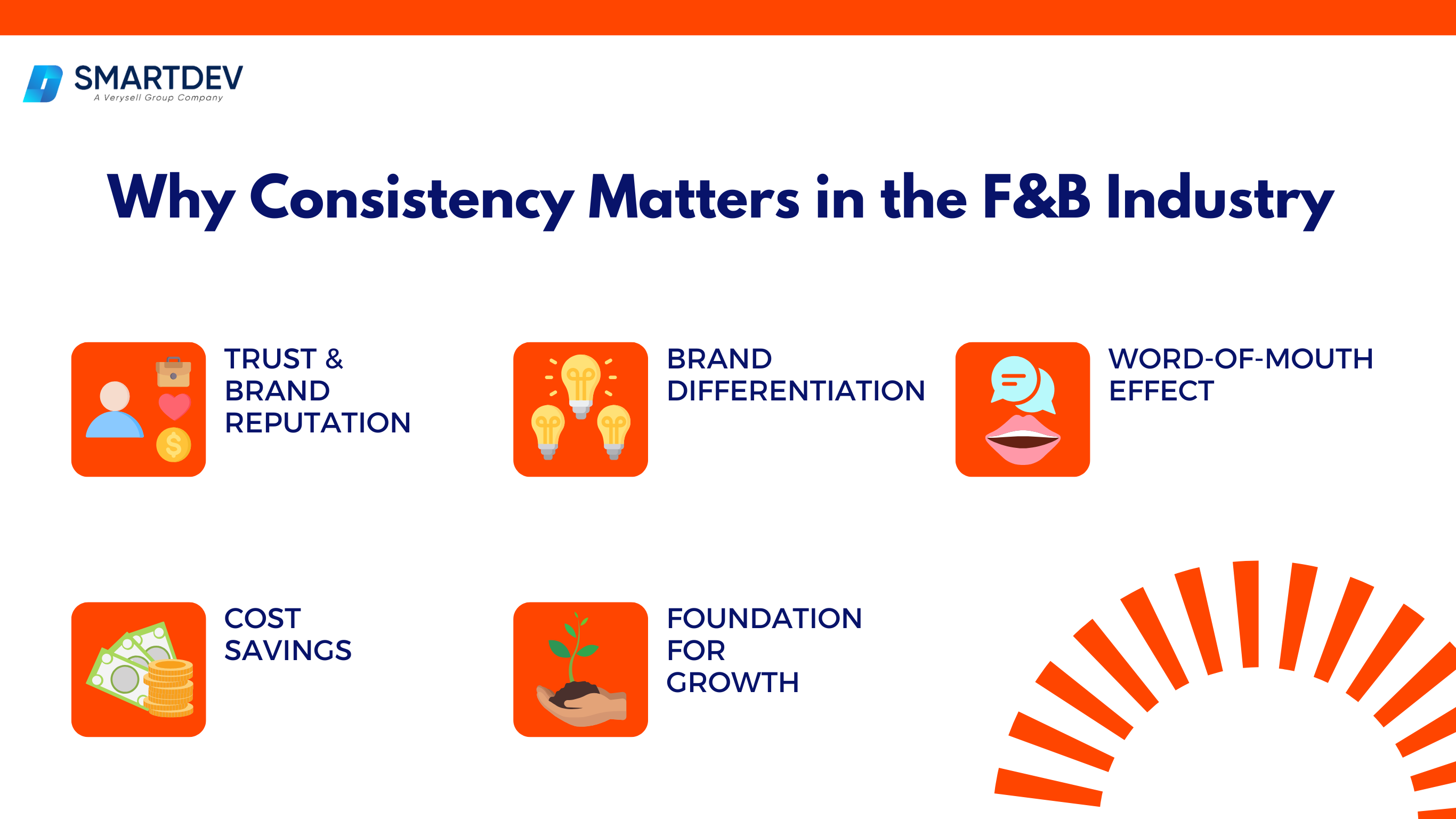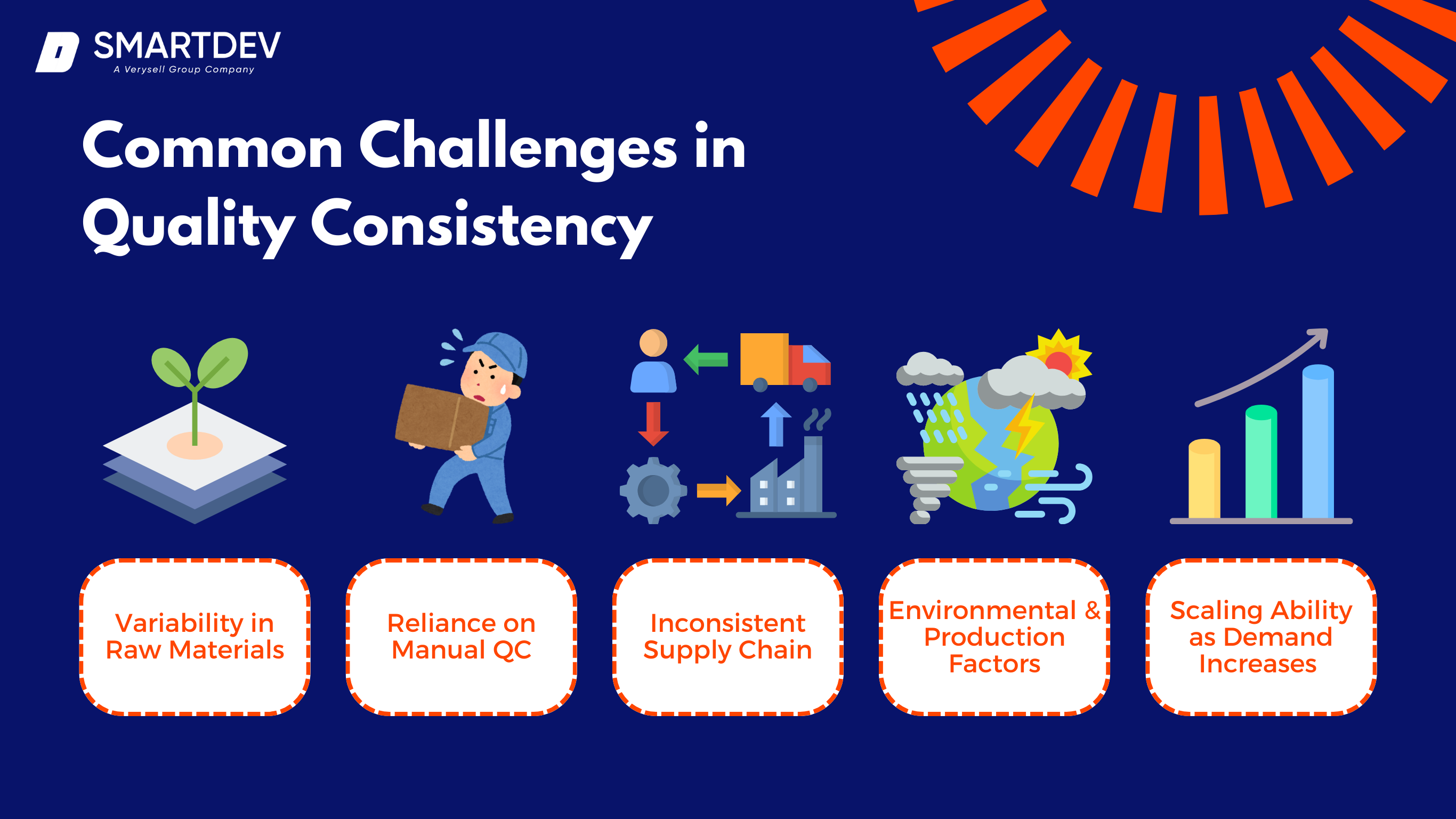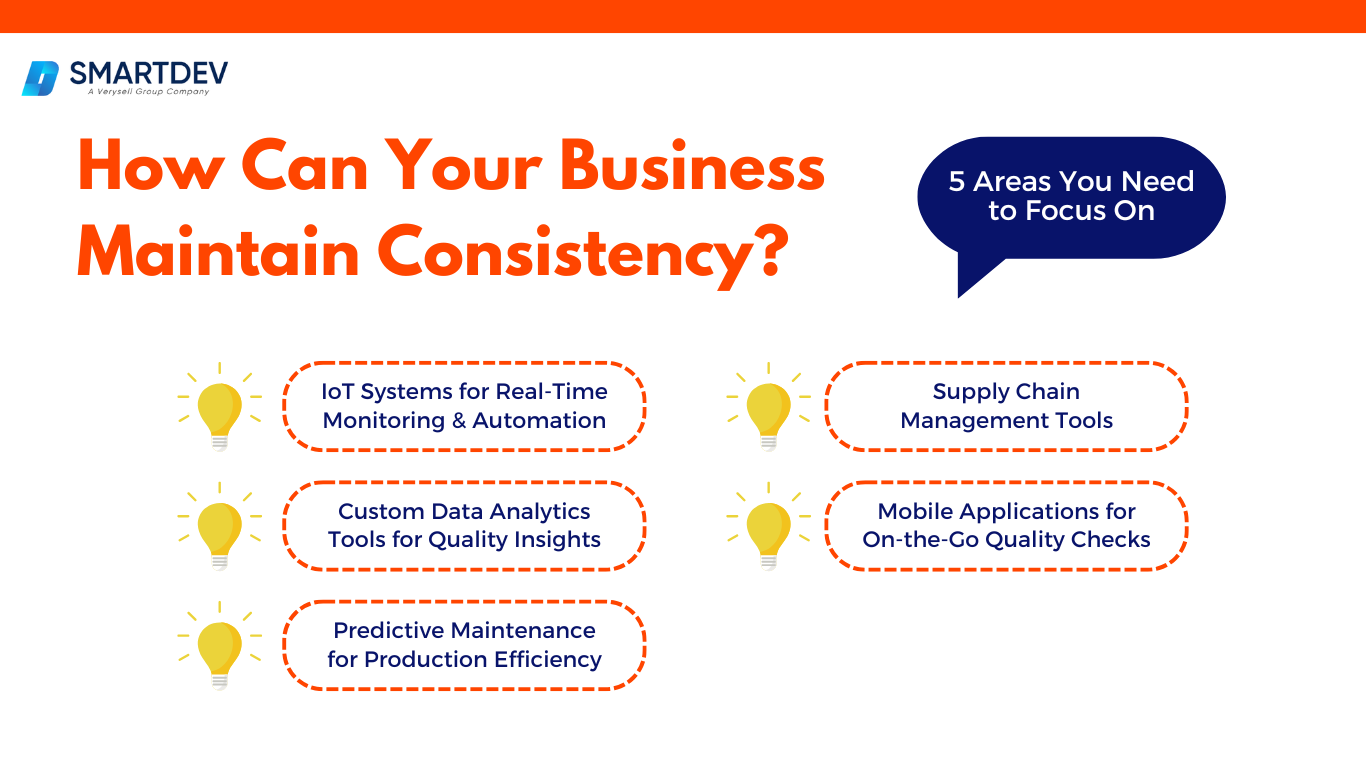“Quality is remembered long after the price is forgotten.” – Aldo Gucci
In the fiercely competitive world of food and beverage, consistency in product quality isn’t just an advantage; it’s essential for survival. For F&B brands, particularly SMEs, maintaining high standards isn’t merely about meeting customer expectations—it’s about building a reputation that fosters trust and loyalty. As countless well-established brands have shown, the path to enduring success lies in delivering the same exceptional experience with every product, every time. In today’s rapidly evolving market, the solution for upholding this level of consistency is clear: harnessing technology.
In this blog, we’ll shed light on the challenges food manufacturing firms face in maintaining quality consistency and reveal how technology can become a powerful ally in achieving flawless product quality. Scroll down to discover the secrets to building a resilient, trusted brand in the F&B industry.
1. Why Consistency Matters in the F&B Industry?
In the F&B industry, quality is the backbone of a brand’s reputation, especially for SMEs competing against established giants. By making consistency a core competency, smaller brands can differentiate themselves in the crowded market.
And here are the 5 powerful impacts of quality consistency you need to know:

No.1 – Building Trust and Brand Reputation
One of the most effective ways to establish this trust is through consistency in product quality. When customers know they can rely on a brand to deliver the same high standards every time, that brand becomes more than just a product—it becomes a dependable choice.
Consistency transforms reliability into a core brand promise. When consumers repeatedly experience the same quality, taste, and safety in a product, they begin to associate these traits with the brand itself. This is crucial in the F&B industry, where taste and sensory experience are closely tied to customer satisfaction. From those experiences, they build trust attached with the brand, which becomes especially valuable in times of market fluctuations, as customers who have had positive experiences are more inclined to stay loyal.
Moreover, loyal customers are also more forgiving if a minor issue does occur, if it is addressed promptly. Their past positive experiences provide a foundation of trust that a single mistake is unlikely to break. Also, brands that consistently deliver on quality demonstrate respect for their audience, showing that they care about delivering what they promise and positioning it as a company that values integrity over profit.
No.2 – Differentiation in a Saturated Market
For SMEs, the most effective way to distinguish themselves isn’t always through flashy advertisements or packaging but through a consistent commitment to quality. This reliability becomes a unique selling point (USP) that resonates deeply with consumers
By consistently delivering a product that meets high standards, SMEs are directly communicating their brand’s commitment to buyers, which can be more memorable to consumers than a one-time promotional campaign. Therefore, this differentiation can serve as a form of “brand insurance”. In moments when competitors struggle with quality issues or supply chain disruptions, an SME known for its consistency stands out as a reliable alternative. This can lead to a stronger market position. Customers who trust a brand’s commitment to quality are more likely to choose it over others, even when economic conditions push them to be more selective.
No.3 – Word-of-Mouth and Brand Advocacy
In any industry, word-of-mouth is one of the most impactful forms of marketing, and consistent quality fuels it. When customers have a dependable, positive experience with a product, they’re more likely to share it with others. For SMEs, which may not have the luxury of massive marketing campaigns, a reputation for high-quality, consistent products can serve as a powerful form of “silent marketing.”
When customers experience a brand’s commitment to quality firsthand, they become more invested in the brand, which in turn creates an emotional connection. Each positive review, whether online or in person, serves as free advertising, spreading awareness of the brand’s commitment to quality. As consumers are more likely to trust personal recommendations, this word-of-mouth effect can be incredibly valuable for SMEs looking to grow their brand recognition and customer base.
No.4 – Cost Savings
One of the primary financial benefits of consistent quality is the reduction in waste. When products are made to a consistent standard, there is less chance of errors or defects that could result in spoiled goods, rework, or disposal. For SMEs that rely on tight profit margins, these savings can be substantial and can be reinvested into growth areas such as marketing, innovation, or expansion.
Consistency also plays a critical role in preventing the need for costly product recalls. The average recall can cost F&B brands millions of dollars, a blow that SMEs are often unprepared to absorb. Additionally, consistent quality directly contributes to efficient production processes, reducing operational costs such as extra quality checks or delivery delays. Consistency also safeguards against fines and penalties related to regulatory compliance since variability in production can lead to non-compliance with regulations, which might result in fines or forced product withdrawals.
No.5 – Foundation for Growth and Expansion
Consistency in product quality makes an F&B brand attractive to distributors and retailers. When a distributor knows a brand’s products are consistently high-quality, they’re more likely to invest in the partnership and promote the brand to retail channels, which can lead to larger orders and broader market access. For an SME, achieving this level of trust with distributors means establishing a broader footprint without the need for significant increases in marketing spend.
Furthermore, a commitment to consistency also lays the groundwork for a successful product line expansion. When a brand is known for its quality, customers are more likely to try new products with confidence, knowing they can expect the same standards they’ve come to trust. Consistency also enables F&B brands to explore opportunities in international markets, where regulatory compliance and quality expectations can be even stricter than in domestic markets. Consistent quality can pave the way for entry into other regions.
In addition, consistent product quality is a major selling point for potential investors. Investors and venture capitalists seek brands with reliable systems and established consumer trust, as these are indicators of long-term stability and potential for scaling.
2. Quality Consistency Challenges in F&B
Unlike larger corporations with extensive resources and elaborate quality management systems, SMEs often face unique challenges that make maintaining consistency a daunting task. Let’s explore some of these common hurdles that degrade quality consistency.

Variability in Raw Materials
For most F&B products, quality begins with the raw materials. Seasonal changes, supplier inconsistencies, and fluctuations in ingredient quality can all affect the final product. SMEs, which often rely on local suppliers or smaller distributors, are particularly vulnerable to these variations. Slight changes in the texture, flavor, or color of raw materials can lead to noticeable differences in the end product, impacting consumer satisfaction and brand perception.
Tech Solution: Implementing a supply chain tracking system with quality analytics enables SMEs to assess each batch of raw materials before they enter production. Advanced tools such as sensor-based quality checks can measure parameters like moisture, acidity, and density in real-time. These tools provide detailed data on each ingredient, allowing SMEs to detect and reject substandard batches before they impact the final product.
Reliance on Manual Quality Checks
Manual quality checks, which many SMEs rely on, can lead to inconsistencies due to human error, fatigue, and varying skill levels among employees. These checks are not only time-consuming but also limit production scalability, as manual processes often struggle to maintain accuracy under high demand.
Tech Solution: Using AI-powered visual inspection systems is one of the most advanced solutions that is being applied in various businesses nowadays. For example, computer vision technology can instantly scan each product on the assembly line to detect defects, such as packaging misalignments or slight discoloration. These systems have a much higher detection accuracy than human inspections and can operate continuously, ensuring each item meets quality standards without slowing down production.
Inconsistent Supply Chain Management
SMEs often experience supply chain disruptions, from delayed shipments to ingredient shortages, which can lead to hurried substitutions or compromises on quality. Without proper tools to manage these fluctuations, food manufacturers may struggle to maintain a steady supply of high-quality ingredients, directly affecting product consistency.
Tech Solution: Real-time supply chain management software gives businesses visibility into stock levels, supplier reliability, and shipping timelines. With features like automated stock level alerts, predictive analytics, and supplier performance tracking, SMEs can proactively address disruptions. For instance, if a supplier is delayed, the system can automatically suggest alternative suppliers that meet the same quality standards, ensuring production remains uninterrupted and consistent.
Environmental and Production Factors
F&B production is sensitive to environmental conditions like temperature, humidity, and even airflow. Even small shifts can impact the taste, texture, and appearance of products, leading to batch inconsistencies. SMEs with limited resources may struggle to maintain strict environmental controls throughout production.
Tech Solution: IoT-enabled sensors allow real-time monitoring of environmental factors in production areas. For instance, temperature and humidity sensors can alert operators if conditions fall outside of set thresholds. Additionally, automated process control systems can adjust equipment settings, like mixer speeds or oven temperatures, in response to changes in the environment, helping to maintain stable production conditions and reducing the risk of inconsistency across batches.
Scaling Challenges as Demand Increases
In case demand grows, F&B manufacturers often face difficulty scaling production without compromising quality. Processes designed for small batches may not deliver the same results when applied to larger volumes, leading to variations in taste, texture, or appearance.
Tech Solution: Scalable production management systems allow SMEs to increase output without sacrificing quality. These systems can adjust recipes, batch sizes, and ingredient proportions automatically as production volume increases, maintaining consistent product quality across all batches. Additionally, predictive maintenance tools can monitor machinery health, ensuring that equipment operates at peak efficiency, reducing the likelihood of quality fluctuations due to equipment wear or malfunction.
3. The Success Stories
Let’s discuss two examples of brands that not only embraced the challenges of consistency but achieved remarkable success by implementing technological solutions to ensure product quality across the board.
PureFlavors – Achieving Excellence with Real-Time Quality Monitoring
Challenge: PureFlavors, a mid-sized company specializing in organic juices and beverages, faced fluctuating product quality due to variations in raw ingredient supplies and manual quality checks. Seasonal differences in ingredients affected flavor profiles, and inconsistencies during production risked compromising the brand’s image of purity and quality.
Solution: To tackle these issues, PureFlavors invested in an IoT-driven quality control system. By deploying sensors on the production line, they could continuously monitor key quality parameters like pH levels, temperature, and ingredient ratios. The IoT system provided real-time alerts if a variable fell out of the desired range, allowing operators to address inconsistencies immediately.
Result: This technology not only streamlined quality checks but also allowed PureFlavors to maintain a consistently high standard across all batches. Customers noticed the difference, reporting a uniform taste and experience with every purchase. The technology empowered the brand to keep its promise of purity, helping PureFlavors expand its customer base and increase customer loyalty. By taking a proactive, tech-driven approach, PureFlavors successfully reduced quality issues by 30% within the first year, significantly enhancing its market reputation.
SmartDev’s client – Enhancing Quality Consistency Through Automated Data Processing
Challenge: A leading fresh produce brand, one of SmartDev’s clients, faced significant challenges in manually inputting and managing large volumes of fruit data, leading to inefficiencies, errors, and delayed reporting. As data grew, maintaining accuracy became harder, slowing operations and limiting timely decision-making. The manual process created bottlenecks, reducing the company’s agility and increasing the risk of costly mistakes. Additionally, this approach made it difficult to achieve real-time insights, further hampering responsive decision-making.
Solution: To overcome these challenges, they partnered with SmartDev to develop a cloud-based system that automates the entire fruit data process, ensuring accuracy, scalability, and efficiency. The solution includes:
- A cloud-based platform that receives input data from various sources, allowing for easy centralization and eliminating the risks associated with manual data entry.
- Integration with a third-party API for data validation, analysis, and processing, ensuring that all data is handled efficiently and accurately.
- An API processes the data automatically, cleaning, structuring, and preparing it for reporting, significantly reducing manual intervention and improving speed and reliability.
Result: By implementing this automated system, the company significantly reduced manual workloads and improved data quality. The automation enabled real-time insights into production processes, allowing for immediate identification and correction of inconsistencies. This proactive approach led to enhanced product quality consistency, reinforcing their reputation for excellence in the F&B market.
Key Learnings
These examples highlight several critical insights for SMEs in the F&B industry looking to harness technology for quality consistency:
- Early Detection of Variability: Using real-time monitoring with IoT helps prevent quality issues before they reach the consumer. This real-time insight is invaluable for maintaining consistency, especially in high-volume production.
- Data-Driven Decisions: Analytics provide clear insights into quality trends, allowing businesses to make proactive adjustments every time rather than reactive fixes.
- Supply Chain Visibility for Consistent Inputs: By implementing technology to monitor supplier quality and track ingredient origins, SMEs can avoid variability that may affect flavor, texture, or appearance. Consistent sourcing leads to a stable foundation for end-product quality.
- Enhanced Customer Loyalty: Consistency builds trust; customers stick with brands that reliably deliver quality in long-term operations. By leveraging technology, SMEs can build a lasting reputation based on unwavering product standards.
4. How Can Your Business Maintain Consistency?
At SmartDev, we understand that for F&B businesses, achieving and maintaining quality consistency can be the difference between success and struggle. Our expertise in crafting technology solutions specifically for the food and beverage manufacturing sector has helped brands streamline their quality control processes and elevate their product standards.
Here’s how we can support your journey to consistent quality:

- IoT Systems for Real-Time Monitoring and Automation: With IoT systems, we enable real-time tracking of temperature, humidity, and other critical factors that impact product quality. Automated alerts help your team respond instantly to any irregularities, maintaining consistency across batches.
- Custom Data Analytics Tools for Quality Insights: SmartDev develops custom analytics tools that allow you to analyze key data points from your production processes. By tracking trends, you can identify potential issues before they affect your product, ensuring that each batch remains as consistent as the last.
- Predictive Maintenance for Production Efficiency: With predictive maintenance solutions, SmartDev can help you monitor the health of your production equipment. This way, potential issues are detected early, allowing for timely maintenance that prevents costly disruptions and maintains product quality.
- Supply Chain Management Tools: Our supply chain management tools provide end-to-end visibility, helping you monitor and control the quality of ingredients and materials. By maintaining high standards across your supply chain, you ensure that only the best inputs go into your products.
- Mobile Applications for On-the-Go Quality Checks: We also develop mobile applications that allow your quality control team to conduct checks efficiently, record data instantly, and access real-time information wherever they are.
Whether you’re just beginning to explore the potential of tech-driven quality management or looking to upgrade existing systems, SmartDev offers scalable solutions designed to meet the unique needs of businesses in the F&B sector, especially for SMEs.
5. Conclusion
While the above challenges exist, technological solutions offer a pathway to achieve the consistency every brand needs to thrive. By implementing smarter quality control technologies, your F&B business can not only keep up with larger competitors but also establish a unique reputation for reliability and excellence.
At SmartDev, we believe in empowering you with the tools and insights to create high-quality, consistent products. So, take the next step – integrate technology into your processes, safeguard your brand’s reputation, and ensure that your customers experience the same trusted quality, time and again.
Your brand’s success story starts with consistency – let SmartDev guide you along the way.








